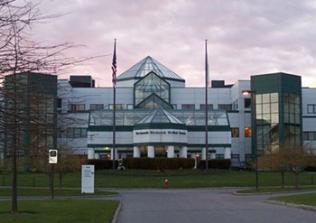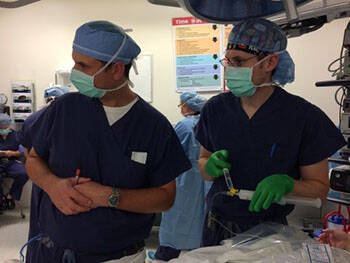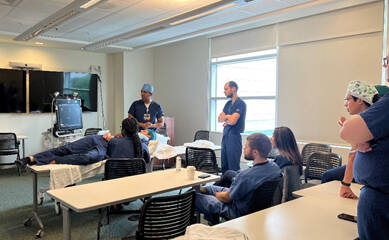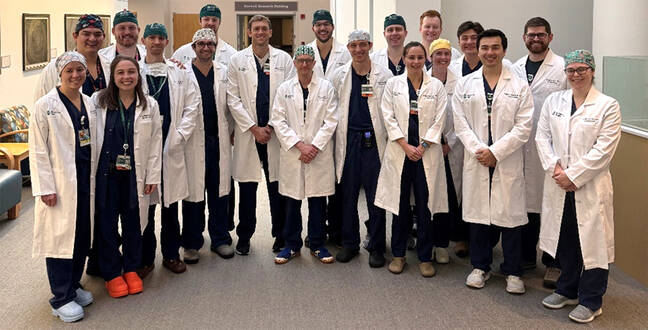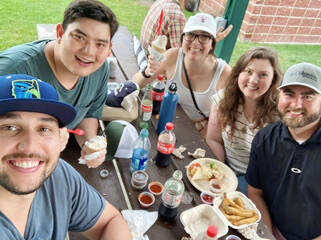Welcome to the Department of Anesthesiology at the Dartmouth Hitchcock Medical Center. We are so glad you will be able to join us for a virtual interview.
To facilitate your virtual visit we ask that you acquaint yourself with our website. This will highlight some of the basic aspects of our program. We look forward to meeting you soon.
Sincerely,
Benjamin D. Morley, MD
Residency Program Director
Ellen A. Seiffert, MD, MS
Associate Program Director
Table of contents
(click topic to follow link)
- Dartmouth Hitchcock Medical Center
- Interview day overview
- What sets us apart?
- Current residents
- A great place to live
- Location
- Policies and agreement
- Other documents and links
Dartmouth Hitchcock Medical Center
We are committed to supporting quality graduate medical education programs and excellence in residency training and research. Furthermore, we commit ourself to providing adequate funding of graduate medical education to ensure support of its faculty, residents, ancillary staff, facilities, and educational resources to achieve this important mission. All of our graduate medical education programs meet or exceed the Institutional and Program Requirements promulgated by the Accreditation Council for Graduate Medical Education (ACGME).
Our Residency and Fellowship Programs offer physicians in training outstanding opportunities to learn from clinicians who are among the best in their fields.
The atmosphere here encourages supportive relationships among residents, fellows, and attending physicians.
Interview day overview
Candidates will be emailed their interview itinerary 5 days prior to their scheduled interview date.
We will be using the platform, WebEx for all interviews. If you are unfamiliar with this platform, please check out the company’s website. Additionally, we suggest downloading the WebEx app to your computer or device.
We will be using our corporate account, and your invitations should work seamlessly. However, if you have any difficulties logging into WebEx, please feel free to contact our Residency Program Coordinator, Bethany Sweet at 603-650-7950 or bethany.a.sweet@hitchcock.org.
What sets us apart?
Our Department of Anesthesiology has offered a fully accredited training program for more than 80 years. Our integrated, transitional-style internship has become an increasingly attractive among residency candidates and provides us with a primary role in the design of a high-quality first-year experience for our residents. In addition, we offer fellowship positions in critical care medicine, pain management, and regional anesthesia.
About the program
The cornerstone of our department's academic mission is training high-quality consultants in anesthesiology. Our 50 staff anesthesiologists come from diverse backgrounds and are committed to resident education. The department is directly responsible for the anesthetic management of more than 30,000 cases annually. We pursue the ideal of anesthesiology as the practice of perioperative medicine and maintain a dominant presence in the areas of critical care medicine and pain management in addition to practicing a wide spectrum of OR anesthesia.
Clinical Base Year (CBY)
Our program introduces learners to the role of the anesthesiologist as a peri-operative physician. The CBY curriculum for the upcoming academic year is composed of core rotations in general internal medicine, cardiology, emergency medicine, general surgery, adult critical care medicine, blood banking, acute pain and palliative care. Interns work directly with our faculty during their anesthesiology, perioperative medicine, echocardiography, ICU, CVCC and acute pain service rotations.
Clinical Anesthesia
From high-turnover cases at the Outpatient Surgery Center to emergent, high-risk cases in the main OR, our residents are challenged throughout their training. Without competition from fellows, our residents have first priority for complex pediatric, cardiothoracic and obstetric cases. Our case mix index (a reflection of patient diversity, clinical complexity and needed resources) is among the highest in the country (top 5%).
Clinical Anesthesiology tutorial overview
Our goal over the introductory month of clinical anesthesia training is to provide each resident with the knowledge base and clinical skills required to prescribe and perform a basic anesthetic for an ASA I or II patient. The introductory tutorial experience is composed of:
- 1 week divided between simulator-based training and OR-based time with a CA-2 or CA-3 resident and a supervising faculty member.
- 3 weeks of one-on-one OR-based time with a Department of Anesthesiology faculty member.
- Orientation Lecture Series – A series of presentations, including lectures and simulation, covering very basic and practical information intended to facilitate resident start-up in clinical anesthesiology. The orientation series is scheduled over several days during the first 3 weeks of clinical activity.
- CA-1 Educational Program: This year-long educational program, incorporating both lecture based as well as hands-on simulation training, has been developed to provide our first year residents with a solid medical knowledge base to complement their clinical experience. The lecture topics and content are specifically designed to best prepare our residents for the BASIC Exam being administered by the ABA
- ACLS certification.
CA-1 residents do not have call responsibilities during their first month in the operating room. During the second month of clinical training each CA-1 resident will have 2 “tag along” calls with the regular call team. This is an opportunity to become more familiar with the various responsibilities of the on-call team (code/trauma calls, OB, off-site airway management, pain patients, etc…) and to pick up a few pearls of wisdom from one of their more senior colleagues. CA-1 residents join the regular resident call pool during the third month of clinical training.
Research
The department has an ongoing commitment to clinical and laboratory research. We encourage residents to participate actively in research projects; residents may choose to pursue The Clinical Scientist Tract and receive 6 months of protected research time. The department is able to provide opportunities for investigation in a wide variety of clinical areas, including masters-level preparation in outcomes research through The Dartmouth Institute for Health Policy and Clinical Practice (TDI).
Regional Block Program
Regional Anesthesia
The Regional Block rotation is required in the CA-1 and CA-2 years and most residents elect to purse an additional experience in their senior year. The resident on rotation is free from other OR duties and is expected to identify potential block candidates, evaluate the patient, and perform the regional block under faculty supervision. Common techniques learned include: brachial plexus, lumbar plexus, femoral, sciatic, saphenous, transverse abdominus plane and paravertebral nerve blocks, as well as catheter-based techniques. Most of these blocks are performed in our dedicated block unit in the main OR or at the Outpatient Surgery Center under ultrasound guidance. Our residents average more than 125 peripheral nerve blocks over the course of their training.
Perioperative Echocardiography
We have an established perioperative echocardiography curriculum that covers both POCUS and TEE. All residents (PGY1-4) rotate at least annually on the Perioperative Echo rotation which gives them a protected block of time to best utilize these resources. As evidence of the strength of this training, many CA-3s have successfully passed the Basic Perioperative TEE certification examination, achieving testamur status.
Simulation
The use of simulator-based training plays a vital role in anesthesia resident training, teaching and reinforcing critical skills in a safe environment. Our residents have the opportunity to practice skills and train for emergency events in our state of the art Patient Safety Training Center (PSTC), an 8,000 sq. ft. simulation complex at Dartmouth Hitchcock Medical Center. Orientation for new CA-1 residents include simulation based training. CA-1 residents are exposed to epidural/spinal and central line placements on mannequins. CA-1, 2 and 3 residents participate in an Anesthesia Crisis Resource Management Course in each year of training.
Transition to Practice
The Transition to Practice rotation is focused on preparing CA-3 residents for their shift to independent practice. Residents function as "pre-tendings" while supervising associate providers and junior residents in the OR. The senior residents are also responsible for making OR assignments and take on added responsibilities of supervision and triage while "running the board". This rotation consistently receives excellent feedback from our residents who appreciate the opportunity to experience the nuances of independent practice in a protected environment.
Pediatric PainFree Program
Our pediatric anesthesia group provides Monday through Friday coverage of the Dartmouth Health Children's PainFree Program. The PainFree Program is a separate unit equipped with its own operating/anesthetizing suite located immediately adjacent to the Pediatric Inpatient unit. Last year the program provided sedation and pain control services to over 2,500 children, including pedi endoscopy and pedi heart caths.
International Anesthesiology Experience (subject to travel restrictions)
For more than 25 years, senior residents have participated in an international pediatric anesthesia experience. CA-3 residents, whom have excelled both clinically and academically, are offered the opportunity to work abroad in a 2 week rotation to a developing country.
We are fortunate that the department continues to fully support our participation in these trips as they provide a tremendous learning opportunity and experience for our residents. We have participated in volunteer missions to Haiti, Vietnam, Peru, Ecuador, India, Nepal, Mali, Bolivia, Brazil, The Philippines, Kosovo, Bangladesh, Tanzania, China, Zambia, and Laos.
International trips roster (PDF)
Combined Anesthesiology-Preventive Medicine Residency
The Department of Anesthesiology offers a unique opportunity for anesthesia residents to earn a master's degree in public health from The Dartmouth Institute for Health Policy and Clinical Practice (TDI) in a combined program with the Leadership Preventive Medicine Residency.
Commitment to teaching
Our clinical faculty members are evaluated on a daily basis by the residents on their teaching skill and consistently receive high marks. There are not just 1 or 2 “good” teachers. In the past ten years, the residents have selected Ten different individuals as “Teacher of the Year.”
A solid foundation
We remain committed to nurturing a dynamic environment that promotes the learning, teaching, and practice of all aspects of our specialty. Our trainees have enjoyed remarkable success in achieving certification from the American Board of Anesthesiology and have proven highly marketable following graduation. Given the extraordinary level of faculty commitment to resident education, our outstanding facilities, and increasingly diverse clinical caseload, our program will continue to be an innovator in the evolution of anesthesiology and perioperative medicine.
Current residents
Our residents are your best resource of information on our program and the Upper Valley. Please reach out to them if you have any questions.
View a list of current residents and their contact information (PDF)
A great place to live
Dartmouth Hitchcock Medical Center is located in the scenic Upper Valley, an area of Northern New England that stretches along the Connecticut River and includes the foothills of New Hampshire's White Mountains and the Green Mountains of Vermont. With ready access to the outdoors and major metropolitan areas (Boston 2 hours, Montreal 3 hours), this area is consistently recognized as an extraordinary place to live and work:
- Best State to Live – VT #1, NH #5 (CNBC 2018)
- Best Small Town in America (Lebanon, Livability.com, 2015)
- Best Town finalist (Lebanon, Outdoor Magazine, 2015)
- Best College Town in America (Hanover, Movoto, 2014)
- Best Cities to Raise an Outdoor Kid (Lebanon, Backpacker.com, 2009)
- Best Places to Live (Hanover, Money Magazine, 2009, 2011, 2019)
Location
We are so sorry we are unable to welcome you personally and give you a tour of the hospital. We hope this little video gives you a taste of what the area has to offer!
The Upper Valley is a wonderful place to raise a family, explore the outdoors, further education (Dartmouth College, River Valley Community College, Community College of Vermont, The Center for Cartoon Studies, and more), a wonderful hub for technological businesses (Fuji Dimatix, TomTom, Hypertherm, Google, and more), and is rich in history and the arts.
The links below will give you just a snapshot of what the area has to offer. We have everything from ski resorts and amazing panoramic views at the top of hiking trails, to some of the most amazing craft beer, cheeses, dining experiences, to hidden games of galleries, shops and more!
- Where to live in the Upper Valley (PDF)
- 100 things you must see, do, or experience in the Upper Valley (PDF)
- The Upper Valley….. a special place (PDF)
- Attractions list (PDF)
- Dining map (PDF)
- Housing solutions brochure (PDF)
- Kid friendly attractions (PDF)
Policies and agreement
The National Resident Matching Program (NRMP) requires that each applicant to an accredited residency program be provided with the institutional policies regarding eligibility requirements and selection process along with a sample copy of the current resident/fellow agreement of appointment in force during interview season.
Please familiarize yourself with each of the documents linked below. Prior to the start of your interview day, you will be asked to sign off indicating you received a copy of these policies and documents.
- MHMH GME Accredited Residency Eligibility Requirements (PDF)
- Selection Process for MHMH GME Accredited Residency and Fellowship Programs (PDF)
- Sample Resident Agreement of Appointment
- Visa Policy and ECFMG Certification Policy
